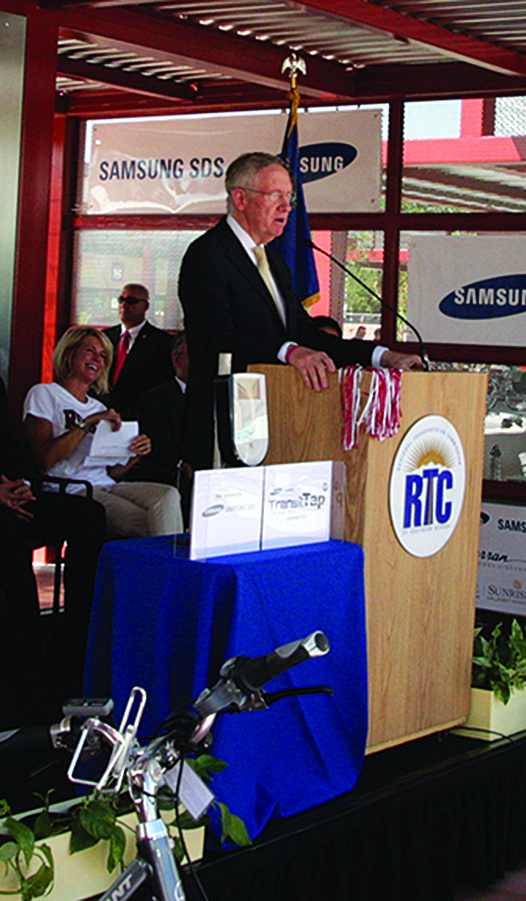
RTC and Samsung SDS partner to launch an advanced transit open payment system in Las Vegas
The Regional Transportation Commission of Southern Nevada (RTC), a transit authority and transportation-planning agency headquartered in Southern Nevada, and Samsung SDS, a global provider of information and communications technology services, announced the launch of a pilot program to test the latest version of Samsung SDS’s Advanced Open Payment Fare System for transit. The pilot is the cornerstone of a partnership between the RTC and Samsung SDS to introduce the latest technologies and systems for fare payment within the public transit system.
For the pilot, the new system called TransitTap allows RTC transit riders on the Centennial Express (CX) bus route to pay fares with the “tap” of their MasterCard® PayPass™ contactless credit or prepaid debit cards, key fobs, or mobile payment tags. TransitTap will also accept payment from smartphones enabled with Near Field Communications (NFC) technology to securely validate payments by wirelessly communicating information from cards or devices to payment terminals via the MasterCard Network.
The pilot began on Monday, September 9 and will continue for 90 days through Sunday, December 8. Transit riders using the CX can look for special TransitTap readers when boarding the vehicles. Samsung SDS has installed TransitTap readers and has deployed a web site and other systems to support contactless fare payment. Readers will display the MasterCard PayPass logo and universal contactless symbol so that riders recognize that their contactless cards and devices will be accepted.
Samsung SDS’s solution for RTC incorporates the latest advances in fare payment technology. Any person with a MasterCard contactless card or device can pay his or her fare without searching for change or finding a vending machine to purchase a pass.
Samsung SDS believes that through this new fare system, riders will have a faster, more convenient, reliable, and secure experience paying transit fares. The company will evaluate results of its pilot program immediately following its 90-day test period. Samsung SDS invested its own resources into developing the technology at no outside cost to the RTC.
“We are glad to partner with Samsung SDS on this pilot that introduces and tests the latest innovation in fare payment technology to our transit riders,” says RTC General Manager Tina Quigley. “It’s critical that we continue to explore these types of emerging technologies that will help enhance our transit system and attract the next generation of transit riders. The experience of paying with TransitTap will be just like shopping in retail: a simple, quick tap on the reader and riders can board and be on their way.”
Riders will also securely and privately access and manage their personal transit accounts in the same way they manage their payment card accounts.
For the prepaid card, Benefit Resource is participating as a partner.
“Benefit Resource is excited to offer a more convenient payment option for the transit riders of Southern Nevada through the contactless BRilliant® Prepaid MasterCard,” says Anthony DiBarnaba, president, Benefit Resource, Inc. “This is the first stage of an evolution to widespread use and acceptance of open payment contactless card technology in the transit industry and we are excited to be partnering with the RTC, Samsung SDS and MasterCard to help pave the way.”
Additional information about the Pilot Program, including details on how to participate and what contactless cards and smart phones may be used to pay fares, will be available on a special website, RTCTransitTap.com.
Samsung SDS
Samsung SDS was established in 1985, and since its founding has become a global leader in information and communications technology (ICT) services, with extensive experience serving both enterprise and public sector customers in international markets.
Samsung SDS’s long-term, extensive commitment to transportation service providers is multi-dimensional: system design and implementation, consulting, operations, and project management. In particular, Samsung SDS has more than seventeen years of experience in development, implementation, integration, and management of complex fare systems in 21 cities. Since 1996, Samsung SDS has installed 17 comprehensive fare systems that currently serve more than 10 million daily riders with more than 15,000 pieces of equipment.
SDS’s experience extends even further, to delivering ICT and related technical and business process services that support service delivery, operations, and customer support for all public mass transit modes, as well as for toll roads, airports, heavy, long-distance rail, and highways.
Samsung SDS has 34 overseas offices in 15 countries, including its North American headquarters in New Jersey, with over 14,000 employees. Samsung SDS also operates nine world-class data centers in six countries to serve its customers. More information is available at
www.sds.samsung.com.

